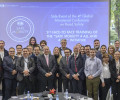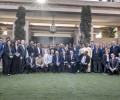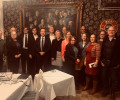FIA HIGH LEVEL PANEL FOR ROAD SAFETY EXPERTS AND ADVISORS MEETING: ACTIVATING THE AUTOMOTIVE INSURANCE MARKETS’ POTENTIAL TO IMPROVE ROAD SAFETY
On 8 April, the FIA High Level Panel for Road Safety (HLP) Experts and Advisors met online to review the advancement of some of the ongoing projects of the HLP and to discuss the role automotive insurance can play in improving road safety, notably through the use of new technologies monitoring driving behaviour.

FIA President and HLP Chairman Jean Todt opened the meeting by thanking the 78 participants for their attendance and commitment to road safety in these challenging times. He underscored the importance of keeping the focus on making roads safer especially in low- and middle-income countries which accounts for 93% of the road casualties worldwide.
The first part of the meeting introduced by HLP Secretary Miquel Nadal was the occasion to update HLP Experts and Advisors about two current projects supported by the Panel.
World Bank Senior Infrastructure Specialist for the Transport Global Practice Veronica Raffo presented the “Mobilising Private Capital for Road Safety” initiative. Led by the World Bank and the International Finance Corporation (IFC), in partnership with iRAP and the HLP, the goal of the initiative is to investigate the potential for private capital mobilisation to bridge the gap in road safety funding by creating a platform and an asset class for saving lives on the world’s roads. Raffo asserted that the ways in which roads are financed require a realignment of incentives to bring safety and commercial interests in line and explained that public authorities, development actors and private investors hold the power to change how road safety is regulated, monitored, and supported by investments. This initiativeaims at developing business models to channel private investment to road safety projects, and leveraging the growing sustainable debt market, including social and sustainability-linked financing.
United Nations Environment Programme (UNEP) Sustainable Mobility Unit Head Rob de Jong informed participants about the latest developments of the “Better Quality of Used Vehicles” project which aims to introduce minimum harmonised quality standards for used vehicles in developing countries, primarily in Africa. He explained that the UNEP is currently working with the importers and exporters to develop and implement these standards to ensure that used vehicles exported from developed to developing countries are safer and cleaner.
The second part of the meeting was dedicated to a strategic discussion about the link between the automotive insurance industry and road safety and how vehicle insurance can contribute to make mobility safer.
This strategic discussion was divided into two sessions: the first, moderated by ANWB Director of Public Affairs and Chairman of the FIA Policy Commission Ferry Smith, focused mainly on policy issues; the second session, moderated by Andrew Bradley, Nestlé former Head of Group Risk Services, focused on the technological opportunities to improve driving behavior.
Since its creation, the HLP has been active in promoting strengthened collaboration between insurance companies and government, particularly through the Movernos Seguros project being developed in partnership with the Inter-American Development Bank. To open the discussion, IDB Transport Lead Specialist Ana María Pinto shared her experience and highlighted the success of the Movernos Seguros project implementation in Paraguay, El Salvador, Costa Rica and Dominican Republic. In these countries, the Movernos Seguros team is working to create or modify compulsory insurance schemes and harness the potential that insurance policies have to help prevent road crashes and to offer better compensation to victims.
Continuing the discussion, Global Road Safety Partnership Chief Executive Officer David Cliff also highlighted the need to improve motor vehicle compulsory insurance schemes to better protect all the road users. He pointed out that in many countries, particularly low- and middle-income countries where most road fatalities occur, there is often times an absence of mandatory insurance cover to meet minimum injury and rehabilitation costs for road crash victims. Cliff explained the social and financial benefits of putting in place effective and affordable compulsory insurance systems for governments and insurers. He highlighted that embedding financial incentives in insurance products and services to drive more safely and to drive safer vehicles offered opportunities to improve road safety.
Former Head of Zürich Sustainability Francis Bouchard explained that insurance companies can also help improve the safety of all road users through the collection of data related to driver behaviour and crashes. Enabling efficient data analysis of unsafe situations, these models can be used to encourage positive change in driving patterns and reduce fatalities. At a global level, the insurance industry is more and more committed to make our roads safer and he reminded participants that insurance is only one element of a larger ecosystem. Insurance policies can act as a powerful and effective behavioural game-changer when regulation and education accompanying the evolution.
eDriving Customer Success Director of Europe, Middle East and Africa, Nick List discussed the benefits of new telematics devices — whether in-built by the manufacturer or powered through a mobile app — and their ability to positively influence driver behaviour towards a 'crash-free culture'. He emphasised the need to define common standards to assess safe driving behaviours, encouraged measures to continuously drive and monitor change through coaching, training, and continuous improvement, and promoted greater use of technology to collate and analyse data.
ANWB Innovation Specialist Martijn Smidt shared an example of how telematics services can be used to assess driver behaviour at the wheel and create a reward-based scheme. As part of the “ANWB Safe Driving” insurance scheme, subscribers’ driving patterns are monitored through a dedicated mobile app or ODB dongle connected to their car. The data collected enables ANWB to calculate a quarterly driving score and moderate insurance fees depending on the driver’s safe driving performance. The system also provides drivers with feedback on their driving every ten days and encourages them to improve their behaviour on the road. In the event of dangerous driving, the Telematics Team will contact the driver and start a dialogue to tackle unsafe habits. Thanks to the “ANWB Safe Driving” project, the Club is now using the data collected to help public authorities improve road safety.
Council of Bureaux (COB), a sub-committee under the ASEAN Insurance Council (AIC), was invited to share the latest developments on the implementation of Protocol 5 for the ASEAN scheme of compulsory motor vehicle insurance of the AFAFGIT as well as the road safety updates from the ASEAN perspective. The ASEAN COB represented by the Vice-Chair, Nopadol Santipakorn, concluded the discussion by highlighting the work of the ASEAN COB to provide third-party liability and compulsory motor insurance to cross-border vehicles in Southeast Asian countries. He presented the ACMI system in which ten countries of the ASEAN member states have agreed to take part. The goals of this system, among others, are to facilitate the issuance and control of Insurance Policy and Blue Card Certificate for ASEAN Members and to provide ASEAN citizens with faster claim services and support in case of a road crash via a mobile app. The ASEAN COB consists of a representative for each National Bureau, a representative of the Transit Transport Coordinating Board, and a representative from the insurance Regulators of each ASEAN Country, as their attendance is compulsory to support the implementation of COB programme.
Miquel Nadal concluded this strategic discussion on motor insurance thanking speakers and participants for their active and interesting contributions. He welcomed the interest of WHO and the World Bank in further exploring the link between insurance and road safety. The HLP Secretariat will analyse in depth the content of the discussion and produce a roadmap on the way forward.

 Facebook
Facebook Twitter
Twitter






